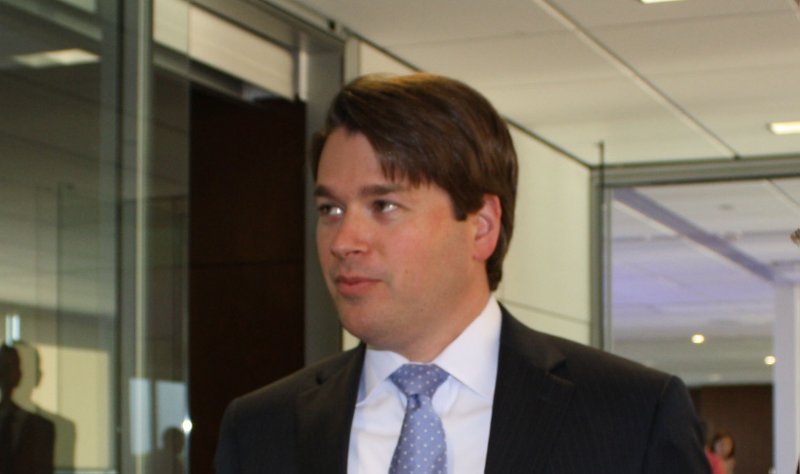The Arkansas Public Employees Retirement System's trustees decided Wednesday to contract with 18 securities monitoring firms.
Securities monitoring firms represent the system in class-action lawsuits over investments. The firms are paid on a contingency fee basis, with payments determined by a judge and coming out of any settlements and awards. Potentially millions of dollars are at stake in large, complex cases that involve many retirement systems.
In a voice vote with no audible dissenters, six trustees voted to approve Trustee Jason Brady's motion for the system to contract with all the firms that submitted their qualifications in April. Trustees Andrea Lea and Dale Douthit abstained from the vote; Trustee Daryl Bassett was absent.
In August, Trustee David Hudson made a motion for the system to contract with the top six firms ranked in a staff analysis, but his motion failed for lack of a second. That delayed a decision.
On Wednesday, when a trustee asked about hiring all 18 firms, the system's executive director, Duncan Baird, noted that a now-retired deputy director, Jay Wills, had indicated "there is nothing that prevents us from doing that."
"They would all monitor, so it may create some kind of administrative workload, but there is nothing that I know of that prevents us from doing that," Baird told the trustees, with about 10 lobbyists representing several of the firms in the audience. "It may be outside of the norm from a quantity perspective."
Brady, who is a chief deputy of state Treasurer Dennis Milligan, said he has faith in Baird and the system's staff "to pick and choose as they wish" among the firms.
Trustee Larry Walther urged the staff to look at the reputation of some of the firms.
At least two firms have received negative news coverage, and Walther, who is secretary of the state's Department of Finance and Administration, said he hopes the system wouldn't engage with some of those firms, "especially if there are others that would be bringing forward maybe the same similar suit."
After saying he would vote for Brady's motion, Trustee Gary Carnahan of Hot Springs said, "But I feel like the staff was asking us to make their life a little easier, and we just dumped it back on 'em."
The system's current securities monitoring firms include Bernstein, Litowitz, Berger & Grossmann; Cohen Milstein Sellers & Toll PPLC; Kessler Topaz Meltzer & Check LLP; Labaton Sucharow; Nix Patterson & Roach, working jointly with the Keil & Goodson law firm; and Spector Roseman & Kodroff.
In mid-January, the trustees decided it was time to refresh the list of firms at the behest of Lea, who is the state auditor. The system last hired such firms in 2013.
Except for Spector Roseman & Kodroff, the system's existing firms reapplied.
Other firms that submitted their qualifications were: Berger Montague; Bernstein Liebhard along with Quinn Emanuel; Block & Leviton; Bleichmar, Fonti & Auld; Kaplan Fox; Lieff Cabraser along with Thrash; Lowey Dannenberg; Pomerantz; Wolf Popper; Rosen Law; Wolf Haldenstein Adler; Hagens Berman; and Scott & Scott.
The six firms ranked highest by the staff were: Bernstein, Litowitz, Berger & Grossmann; Cohen Milstein Sellers & Toll; Hagens Berman; Labaton Sucharow; Bernstein Liebhard along with Quinn Emanuel; and Scott & Scott. The Nix Patterson & Roach law firm, working jointly with Keil & Goodson, was ranked last of the 18 firms.
Walther on Wednesday asked about how many class-action lawsuits filed by securities monitoring firms the system been involved in, as well as how the system has benefited.
Baird said the system receives settlements on a frequent basis as a member of a class in these lawsuits. He said the system is less frequently a lead plaintiff in a class-action lawsuit, "maybe less than once a year if you looked over the last few years."
He said the system receives a settlement "whether you are a member of the class or whether you are the lead plaintiff. You are not necessarily benefiting from a dollar standpoint because you are the leader of the class."
Baird said the system is the lead plaintiff in two active class-action lawsuits.
Walther asked about the state's benefit from the last resolved lawsuit in which the system was the lead plaintiff.
Laura Gilson, the system's chief legal counsel, said, "The reports that routinely we are provided by the securities monitoring counsel typically just give you the total class recovery, [and] they don't break it down to what the system receives.
"Sometimes when you settle a lawsuit, you may not get the money for a couple of years later, and so [when] they come into our system and they hit the accounting system, we mark it, but we may not be able to tie that back to a particular case without a little bit more forensic work," she said. "It wasn't really apparent from the information that I receive from the different securities litigation firms, so that's a very long way of saying I really don't know."
Lea recused herself from participating in discussion and the selection of the securities monitoring firms on Wednesday, like she did in August, because the auditor's office has a contingency contract with one of the firms.
Douthit, of Russellville, whom Gov. Asa Hutchinson appointed to the board last month, said he recused because he wasn't on the board when it previously considered the matter.
Metro on 11/21/2019
